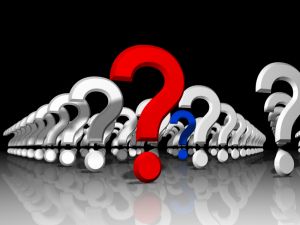
Image Credit: immrchris
In Dutch there is a distinction between ‘yes/no’ questions and questions beginning with a question word (also known as interrogative). Both situations require that you invert (reverse position) the subject and the verb.
This is because Dutch is a verb second (V2) language. Meaning that, in the main clause, the verb is found in the second position.
For example:
Ik ga naar de bioscoop. (I go to the cinema)
Questions Beginning with a Question Word
When you form a question with a question word (who, what, when, where, etc) the question word comes first, followed by the conjugated verb and the subject takes the third position.
- Wat wil je vanavond doen? (What would you like to do tonight?)
- Waar woont u? (Where do you live?)
The inversion is required because the question word takes up the first place and the verb needs to be in the second place.
There are of course exceptions to the verb second rule and yes/no questions are one of these exceptions.
Yes/No Questions
Yes/no questions are questions that can be answered with a yes or no. To form them, the conjugated verb takes the first position and is then followed by the subject.
- Heeft u een hond? (Do you have a dog?)
- Ga je mee naar de dierentuin. (Are you going to the zoo with me/us?)
The subject and verb are inverted to create the yes/no question form. The verb does not end up in the second position because yes/no questions are an exception to the verb second rule.
In both question forms it is important to remember to conjugate the verb to match the subject form.
Spelen jullie morgen? (Are you (plural) playing tomorrow?)
However, don’t forget that when jij or je follows the verb, the -t ending is dropped.
Werk je in een restaurant? (Do you work in a restaurant?)
Question Words Vocabulary
hoe – how
hoeveel – how much/many
waar – where
waar…vandaan – where from
wat – what
welk/welke – which (welk is for het-words, welke is for de-words)
wat voor – what kind of
wie – who
wanneer – when
waarom – why
Answers from Tuesday’s Post
het toilet
het papier
het toiletpapier
de koffie
de melk
de koffiemelk
het poeder
de suiker
de poedersuiker
de aardappel
de salade
de aardappelsalade
de chocolade
de vla
de chocoladevla
Practice for Questions and Question Words
Enter the correct question word.
1. _______ is je beste vriendin?
2. _______ wil je eten?
3. _______ kleur zoekt u?
Put the questions in the correct word order and conjugate the italicized word.
4. de trein – vertrekken – naar Rotterdam – hoe laat
5. bus – rijden – welke – het centrum – naar
6. kosten – naar Den Haag – een enkele reis – wat
Again, I’ll post the answers in a later post.






Comments:
Alejandra:
Thanks for sharing all this into! Your blog is amazing! Greetings from uruguay
Amir:
@Alejandra I really enjoy it.
It is very intresting topic
Thnx
Kila:
Is it *incorrect* to say ” ‘t koop ik niet” to say “I don’t buy it”? I know “Ik koop ‘t niet” is preferred, but is the former actually wrong? I know Google Translate is often incorrect. Thank you.
Sten:
@Kila ‘t is short for dit/dat (this/that), which you would normally not bring up at the beginning of a sentence, because ‘t can also be short for “het” (the), which you are more likely to find at the beginning of a sentence (“het ding koop ik niet” = “the thing I don’t buy). So “Ik koop ‘t niet” (I don’t buy it) makes a lot more sense.
Just don’t say “‘t koop ik niet”. If you need to use that sentence structure, say “dit/dat koop ik niet”.